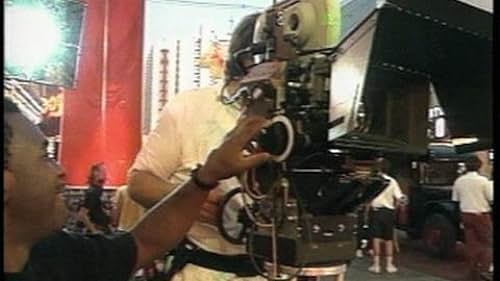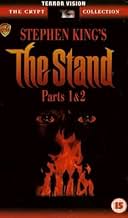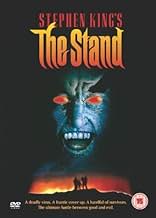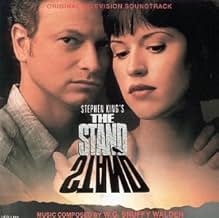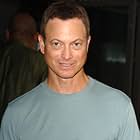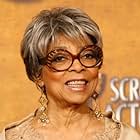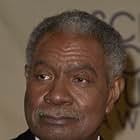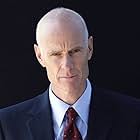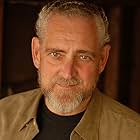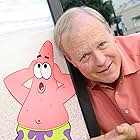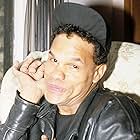After a deadly plague kills most of the world's population, the remaining survivors split into two groups - one led by a benevolent elder and the other by a malevolent being - to face each o... Read allAfter a deadly plague kills most of the world's population, the remaining survivors split into two groups - one led by a benevolent elder and the other by a malevolent being - to face each other in a final battle between good and evil.After a deadly plague kills most of the world's population, the remaining survivors split into two groups - one led by a benevolent elder and the other by a malevolent being - to face each other in a final battle between good and evil.
- Won 2 Primetime Emmys
- 3 wins & 7 nominations total
Storyline
Did you know
- TriviaFor years it was planned to make this story into a theatrical film, directed by George A. Romero. Stephen King did many drafts to make it of a suitable length for a feature film, and when he couldn't get it short enough they considered breaking it into two separate films before finally letting Rospo Pallenberg write a draft. But before they could make it, King was offered the chance to make this mini-series for television.
- GoofsWhen Nick and Tom first meet Ralph, they are headed in opposite directions, but going to the same place. Nick and Tom get into Ralph's truck and head back the way they came from, yet they are all allegedly headed to Nebraska.
- Quotes
Scientist: I can't believe a piece of Southern Fried Chicken like you is going to survive this.
- Alternate versionsThe version most widely seen now on DVD and Blu-ray differs from the original TV broadcast and Worldvision home video release. Among numerous small changes to credits and transitions (for instance removing many of the fades to black for commercial), it also restores explicit footage to two scenes and adds a third altogether.
- The death of Dayna in Randall Flagg's office is more graphic, with Flagg picking up and tossing away her bloodied dead body after she commits suicide by throwing herself onto a jagged glass frame; the original version instead cut to the lobby downstairs, where people look up uneasily upon hearing Flagg roar.
- Nadine and Flagg's "wedding night" is longer, with more reaction shots of Nadine and additional shots of Flagg unzipping his pants and positioning himself.
- A short scene has been added in which Flagg drives back to Las Vegas the next morning, with Nadine (with her hair bleached white) in the passenger seat.
- ConnectionsFeatured in The 46th Annual Primetime Emmy Awards (1994)
- SoundtracksBABY CAN U DIG YOUR MAN
Composed by Al Kooper & Stephen King
Performed by Al Kooper
Produced by Al Kooper for Stephen King's "The Stand"
My worst fears were realised when I walked into my local video store one fine day last year and saw a poster for its upcoming release. The words "teleplay" struck instant fear into my heart, having been burned before by the made for TV adaptation of It, and when I scanned the cast list I nearly started screaming. Molly Ringwald?!! Rob Lowe?!! As Nick Andros?!! It was horrible, just horrible, and I resolved never to subject myself to the nightmare which I knew waited inside that double-cassette cover.
But one day I got bored, a few hours to kill before I went out on the town, so I figured what the heck, might as well give it a go, I can always drown my sorrows after it's over. I took the video home, made myself a strong cup of coffee, and sat down to partake of the carnival of horrors which had patiently waited to entrap me.
The film runs for a tad under six hours. I watched nearly five that day, and only left the last hour until the following day because the sun had set and fellow partygoers were banging on my door. This scene has been repeated by virtually everybody I know who has hired the film, and with good reason.
The Stand is a tour de force, a film which proves that a good story well told with a capable cast can overcome any censorship restrictions television cares to impose. I just don't know where to begin in my praise of this masterwork. I could praise those concerned for enticing King himself to write the teleplay, thereby ensuring it followed the novel almost to the letter, allowing the characters time to grow, to become real people, people we can love or hate, people we can root for or hiss at. Every major scene is there, lovingly recreated for our viewing pleasure, and it proves that King can claim a keen eye for the visual medium amongst his many talents.
I could praise the casting, which is as damn near perfect as you're ever going to get. There's Gary Sinise ("Lieutenant Dan" from Forrest Gump), who plays Stu Redman like he was born to the role. Molly Ringwald and Rob Lowe actually turn in stellar performances. The characters I'd known and loved - Tom Cullen, Lloyd, Glen Bateman, Larry Underwood - are all there, and when the movie was over I discovered that, however I had pictured them when I had read the novel, it was now impossible to imagine them as anything else. That's perhaps the highest praise which can be afforded an actor, and whoever the casting director was should have a statue erected in their honour. I would also like to mention the superb casting of Randall Flagg, "The Walkin' Dude". I couldn't believe it when he first appeared - "That's not him!" were the exact words which issued from my lips. The Walkin' Dude was supposed to be evil, fer chrissakes, and this guy looked liked he'd just stepped out of a Levis commercial. However, as the film wore on I realised just what a magical piece of casting had been wrought. Flagg is evil personified, sure enough, but he's also charismatic. After all, how many people, however blackhearted, would follow someone who actually resembled the evil he represented? So we have this good-looking, amiable dude who runs around recruiting his dark army, but there's always something not quite right about him, an edge to his smile, a flash in his eyes. Then, as things begin to fall apart, his true character reasserts itself, and it's even more shocking by virtue of the "nice-guy" image which he'd previously worn. Classic stuff, and it proved beyond a doubt why I'm an accountant, not a casting director.
I could praise the music, which unfailingly matches the mood, and which positively soars during the Wild Bunch-style scenes in which the four chosen ones commence their pilgrimage to Vegas. This is the kind of thing which doesn't take much to do, but which lends an epic quality to the proceedings.
And that's what really nails this film down as a classic - the little touches which ensure the film stays in the mind long after the credits have rolled. The slow degeneration of Ed Harris' general. Molly Ringwald's understated reaction to the death of her beloved father. Lloyd's realisation that things are falling apart, countered by his knowledge that he's committed, for better or worse. So much could have gone wrong in these six hours, so many cliché's enacted, and every potential obstacle is avoided with the expert skill of an Olympic slalom competitor.
I urge you to head down to your video store this weekend and rent this film. Take the phone off the hook, draw the blinds, stock up on Coke and munchies and settle in for six hours of unadulterated brilliance.
It *shines*, friends. I can say no more than that.
Details
Contribute to this page


